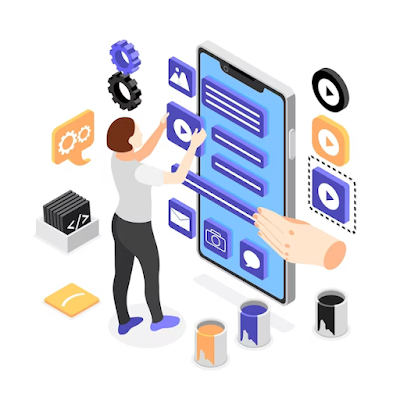In the dynamic landscape of digital commerce, staying ahead of the curve is paramount for businesses. As we step into 2024, Progressive Web Apps (PWAs) have emerged as a game-changer, providing a seamless, engaging, and fast user experience across various devices. This article explores the 14 best PWA examples specifically tailored for Retail and ECommerce, showcasing how these innovative applications redefine the online shopping experience.
Understanding Progressive Web Apps (PWAs)
Before delving into the impressive PWA examples, it's crucial to grasp the essence of Progressive Web Apps. PWAs are web applications that utilize modern web technologies to deliver an app-like experience to users. They combine the best of both web and mobile apps, offering offline functionality, smooth navigation, and enhanced performance.
Key Features of Progressive Web Apps
Responsive Design: PWAs adapt to various screen sizes, ensuring a consistent and enjoyable experience on desktops, tablets, and smartphones.
Offline Functionality: Users can access certain features and content even when offline, enhancing accessibility and convenience.
Fast Loading Times: PWAs leverage caching strategies to load quickly, reducing bounce rates and improving user satisfaction.
Push Notifications: Engage users with timely and personalized notifications, fostering customer retention.
The Rise of Progressive Web App Development in Retail Ecommerce
As the retail landscape continues to evolve, businesses are increasingly turning to progressive web app development to meet the growing expectations of tech-savvy consumers. The demand for seamless and immersive online shopping experiences has led to a surge in hiring PWA developers and investing in retail ecommerce app development.
Benefits of Progressive Web Apps in Retail Ecommerce
Enhanced User Experience: PWAs provide a smooth and engaging shopping experience, boosting user satisfaction and loyalty.
Improved Performance: Faster loading times and responsive design contribute to reduced bounce rates and increased conversions.
Cross-Platform Compatibility: Reach a broader audience by ensuring your retail ecommerce app functions seamlessly on various devices and operating systems.
Cost-Effective Development: Compared to native app development, building PWAs is often more cost-effective, making it an attractive option for businesses of all sizes.
Hire PWA Developer: Investing in the Future of Retail Ecommerce
To harness the full potential of PWAs, businesses are increasingly opting to hire PWA developers. These skilled professionals play a pivotal role in crafting innovative and high-performing progressive web apps tailored to the unique needs of retail ecommerce.
14 Best Progressive Web Apps Examples for Retail & ECommerce 2024
Now, let's explore some exemplary PWAs that have set the standard for retail and ecommerce in 2024.
1. Amazon's PWA: Elevating the ECommerce Giant
Amazon's PWA is a stellar example of how industry leaders leverage progressive web app development. The app ensures a seamless shopping experience, with features like one-click purchasing and personalized product recommendations.
2. Alibaba's PWAs: Bridging Global Markets
Alibaba's progressive web apps cater to a diverse and global audience, offering multilingual support and localized experiences. The apps showcase the scalability and flexibility that PWAs bring to ecommerce giants.
3. Etsy's PWA: Embracing Creativity with Seamless Navigation
Etsy's PWA stands out for its intuitive navigation and user-friendly interface. The app's offline functionality allows users to explore and purchase unique handmade items even in areas with poor connectivity.
4. Flipkart's Progressive Web App: Revolutionizing Indian ECommerce
As one of India's leading ecommerce platforms, Flipkart's PWA ensures a smooth and fast shopping experience for users across the country. The app's progressive enhancements contribute to increased user engagement.
5. Nike's PWA: Elevating the Customer Experience
Nike's progressive web app focuses on delivering a personalized and immersive experience to users. The app seamlessly integrates with Nike's loyalty program and utilizes push notifications to keep customers engaged.
6. Walmart's PWA: Embracing Accessibility for All
Walmart's commitment to accessibility is evident in its PWA, which prioritizes a user-friendly experience for all customers. The app's performance optimization contributes to faster load times, enhancing the overall shopping journey.
7. Zara's Progressive Web App: Setting Trends Online
Zara's PWA reflects the brand's commitment to staying ahead of fashion trends. The app's visually appealing design and quick loading times contribute to a delightful shopping experience for fashion enthusiasts.
8. ASOS's PWA: Seamlessly Connecting Fashion and Technology
ASOS's PWA seamlessly integrates cutting-edge fashion with technology. The app's progressive features, such as offline browsing and push notifications, ensure that users stay connected with the latest trends anytime, anywhere.
9. Target's PWA: Meeting Diverse Shopper Needs
Target's PWA excels in catering to diverse shopper needs with features like barcode scanning for in-store purchases and personalized recommendations. The app's responsive design adapts to the preferences of a wide-ranging customer base.
10. Lululemon's Progressive Web App: Focusing on Wellness and Performance
Lululemon's PWA reflects the brand's commitment to wellness and performance. The app's seamless navigation and performance enhancements contribute to an enhanced shopping experience for fitness enthusiasts.
11. Shopify's PWA: Empowering ECommerce Entrepreneurs
Shopify's PWA empowers ecommerce entrepreneurs by providing a robust and customizable platform for online businesses. The app's ease of use and quick setup contribute to its popularity among small and medium-sized enterprises.
12. Myntra's PWA: Redefining Online Fashion Shopping
Myntra's progressive web app redefines online fashion shopping with its visually appealing design and personalized recommendations. The app's smooth performance and quick loading times elevate the overall shopping experience.
13. Sephora's Progressive Web App: Enhancing Beauty Shopping
Sephora's PWA enhances the beauty shopping experience with features like virtual try-ons and product tutorials. The app's focus on user engagement and personalization sets it apart in the cosmetics and skincare industry.
14. Best Buy's PWA: Transforming Electronics Retail
Best Buy's PWA transforms the electronics retail experience with its user-friendly interface and seamless navigation. The app's integration of real-time inventory and personalized product recommendations contributes to increased customer satisfaction.
Conclusion: Embracing the Future of Retail ECommerce
In the ever-evolving landscape of retail ecommerce, embracing progressive web app development is no longer an option but a necessity. The 14 examples highlighted in this article showcase the diverse applications of PWAs in enhancing the online shopping experience. As businesses strive to stay competitive in 2024 and beyond, the decision to hire PWA developers and invest in retail ecommerce app development becomes a strategic imperative, propelling them toward a future where seamless, engaging, and fast user experiences reign supreme.


